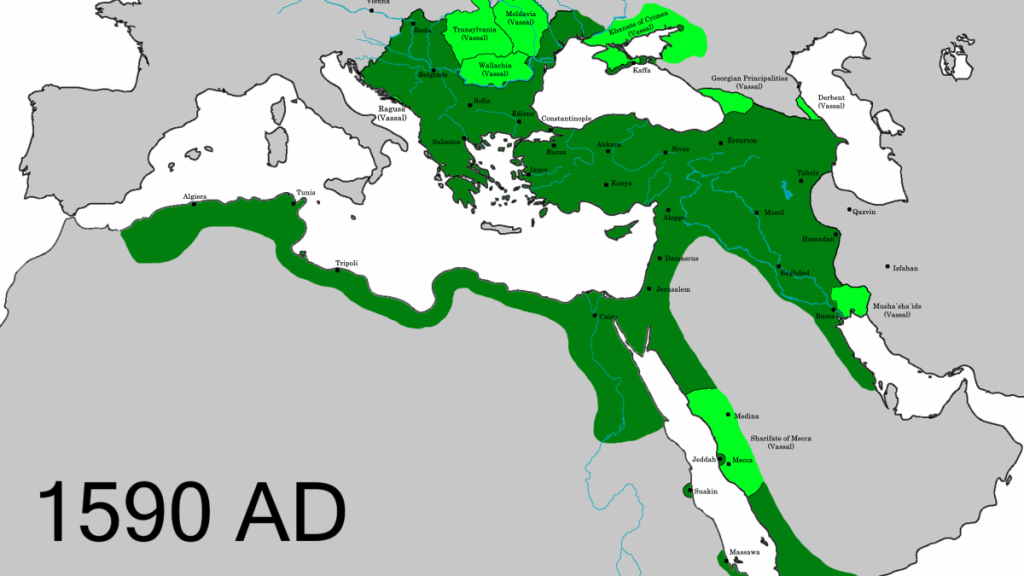Have you ever wondered if the Ottoman Empire still exists today? It’s a question that sparks curiosity and invites you to explore a fascinating part of history.
You might think it’s long gone, but what if traces of it still influence the world around you? Keep reading, because what you discover might surprise you and change how you see history—and even your own place in the world.

Credit: owlcation.com
History Of The Ottoman Empire
The history of the Ottoman Empire is a fascinating journey through centuries of power, culture, and change. It spans from a small principality to one of the largest empires in history. Understanding this history helps you see how it shaped the modern world and why it still captures interest today.
Rise And Expansion
The Ottoman Empire began in the late 13th century under Osman I. It started as a small state in northwestern Anatolia.
Through smart military strategies and alliances, the Ottomans quickly expanded their territory. They captured Constantinople in 1453, marking a turning point that made the city their capital and a gateway between Europe and Asia.
Have you ever wondered how a small tribe grew into a vast empire? The Ottomans’ ability to adapt and absorb different cultures played a key role.
Golden Age
The empire’s Golden Age came during the 16th century under Suleiman the Magnificent. His reign brought great military success, legal reform, and cultural achievements.
Art, architecture, and science flourished. Buildings like the Suleymaniye Mosque still stand as testaments to this vibrant era.
Imagine living in a time when your ruler not only conquered lands but also improved laws and supported poets and scientists. This balance of power and culture made the empire respected worldwide.
Decline And Fall
The decline started in the late 17th century after a series of military defeats and internal problems. Corruption and administrative inefficiencies weakened the empire.
Despite attempts at reform, the empire struggled to keep up with European powers. It officially ended in 1922 after World War I, leading to the creation of modern Turkey.
Does the empire truly vanish, or do its influences still exist in today’s culture, politics, and borders? This question invites you to look beyond the dates and see the legacy left behind.

Credit: www.reddit.com
Legacy In Modern Turkey
The Ottoman Empire may have officially ended in the early 20th century, but its legacy lives on vividly in modern Turkey. This legacy shapes daily life, influences politics, and decorates the country’s landscape. Understanding this influence helps you appreciate how history molds present identities and cultures.
Cultural Influence
The Ottoman Empire left a deep cultural mark on Turkey that you can still see today. Turkish cuisine, for example, blends flavors from across the empire, creating dishes rich in history and taste. You might enjoy foods like baklava or kebabs, which carry stories from centuries ago.
Language also carries Ottoman traces. Many Turkish words and expressions have roots in Ottoman Turkish, connecting modern speakers to their past. This cultural continuity influences music, literature, and even daily customs, making the Ottoman heritage part of your everyday experience in Turkey.
Political Impact
The foundation of modern Turkey’s political system was heavily influenced by the fall of the Ottoman Empire. The shift from a sultanate to a republic introduced new ideas about governance, democracy, and secularism. These changes still guide Turkey’s political debates and structures today.
You might find it interesting that current political parties and policies often reflect tensions between Ottoman traditions and republican ideals. This ongoing dialogue shapes how Turkey navigates its identity in a globalized world. How do you think historical legacies affect your country’s politics?
Architectural Heritage
Walking through Istanbul or Ankara, you’ll notice Ottoman architecture everywhere. Magnificent mosques, palaces, and bridges tell stories of empire and artistry. Buildings like the Blue Mosque or Topkapi Palace are not just tourist attractions; they are living monuments to Ottoman craftsmanship.
These structures use intricate designs and bold engineering that inspire modern Turkish architects. They also offer practical lessons in blending beauty with function. Next time you visit one, ask yourself how historical buildings influence the spaces you live and work in today.
Political Successors
The Ottoman Empire ended in the early 20th century, but its influence remains in modern Turkey. Political successors continue to shape the region’s history and culture today.
The Ottoman Empire, once a vast territory, ceased to exist in 1922. Its dissolution gave rise to new political entities. These successors shaped the modern Middle East and parts of Europe. Many of them still carry traces of Ottoman influence. Let’s explore these political successors.Republic Of Turkey
The Republic of Turkey emerged from the Ottoman Empire’s remnants. Founded in 1923, it marked a significant shift. Mustafa Kemal Atatürk led this transformation. He introduced wide-ranging reforms. The capital moved from Istanbul to Ankara. Turkey embraced secularism, distancing from Ottoman traditions. Atatürk’s vision modernized the nation. Today, Turkey plays a key role in geopolitics. Its strategic location links Europe and Asia. Turkish culture blends old and new influences. The legacy of the Ottoman Empire is still evident.Other Former Ottoman Territories
Other territories also arose from the Ottoman Empire. Countries like Iraq, Syria, and Lebanon gained independence. Each had unique paths to sovereignty. Borders often ignored ethnic and religious divisions. This caused tensions and conflicts. The Balkans saw the emergence of new states. Nations like Serbia, Bosnia, and Albania formed. These regions share a complex history. Ottoman cultural impacts remain visible. Architecture, language, and cuisine reflect this heritage. The political landscape continues to evolve. These territories hold vital roles in global affairs. Their histories are intertwined with the Ottoman past.Common Myths And Misconceptions
Many people wonder if the Ottoman Empire still exists in some form today. Various myths and misconceptions swirl around this topic. Some believe the empire never truly ended. Others think it continues under different names or forms. These ideas often confuse history with current events. Clearing up these myths helps us understand the past better.
Survival Claims
Some claim the Ottoman Empire survived after World War I. They say it transformed into a secret government or a hidden power group. These stories lack evidence. The empire officially ended in 1922. The Republic of Turkey replaced it in 1923. No credible proof shows the empire still rules or controls anything today.
Rumors about hidden Ottoman rulers often appear online. They mix facts with fiction. These claims distract from real history. Scholars agree the empire is gone. It does not exist as a political or military entity now.
Neo-ottomanism
Neo-Ottomanism is a term people use for Turkey’s modern political ideas. It refers to some efforts to revive Ottoman culture or influence. This includes stronger ties with former Ottoman lands. It also means promoting Ottoman history and identity.
This movement is not a return of the empire. It is a political strategy. Turkey remains a democratic republic with its own government. Neo-Ottomanism does not mean the empire exists again. It only shows how history influences today’s politics.
International Recognition And Status
The question of whether the Ottoman Empire still exists touches on its international recognition and status today. Although the empire was once a dominant force spanning three continents, its legal and diplomatic footprint has long since changed. Understanding how the world officially views the Ottoman Empire now helps clarify its current place in history and international relations.
Legal Dissolution
The Ottoman Empire officially ended with the Treaty of Lausanne in 1923. This treaty recognized the sovereignty of the Republic of Turkey, effectively dissolving the empire’s political and legal existence. Since then, no country or international body recognizes the Ottoman Empire as a continuing state.
This legal dissolution means the empire cannot hold diplomatic relations or sign treaties. Its assets and territories were either absorbed by successor states or placed under international mandates. Have you ever wondered how such a vast empire just vanished from the legal map overnight?
Modern Diplomatic Relations
Today, Turkey represents the political and diplomatic legacy of the Ottoman Empire. It maintains formal diplomatic relations with almost every nation, continuing many of the empire’s historical ties. However, these relations are based on the Republic of Turkey, not the Ottoman Empire.
Understanding this distinction is crucial if you’re exploring historical continuity in international affairs. Turkey’s role in organizations like the United Nations and NATO clearly defines its modern status. So, while the empire’s influence lingers culturally, its legal and diplomatic presence no longer exists.

Credit: uk.news.yahoo.com
Frequently Asked Questions
Does The Ottoman Empire Still Exist Today?
No, the Ottoman Empire officially ended in 1922. It was replaced by the Republic of Turkey in 1923. The empire no longer exists as a political entity.
When Did The Ottoman Empire Officially End?
The Ottoman Empire officially ended on November 1, 1922. This marked the abolition of the Sultanate and the empire’s dissolution.
What Replaced The Ottoman Empire After Its Fall?
The Republic of Turkey replaced the Ottoman Empire in 1923. It was founded by Mustafa Kemal Atatürk as a modern nation-state.
Are There Any Remnants Of The Ottoman Empire Today?
Yes, Ottoman architecture and cultural influences remain in Turkey and nearby regions. However, the empire itself does not exist.
Conclusion
The Ottoman Empire does not exist today as a political power. Its legacy lives on in culture, architecture, and history. Modern Turkey rose from the empire’s end in 1924. People still study the empire to understand the past. Its influence shaped many countries and traditions.
The empire’s story helps us learn about change and time. History shows how great empires rise and fall. The Ottoman Empire remains important in world history books. Its spirit endures through art, language, and ideas. The past connects to the present in many ways.





